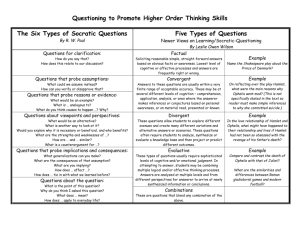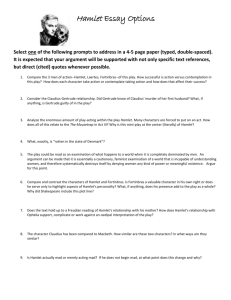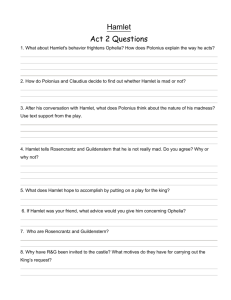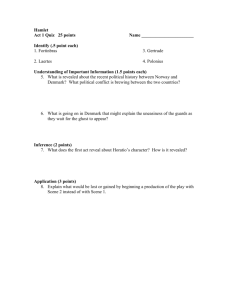Hamlet Essay.doc
advertisement
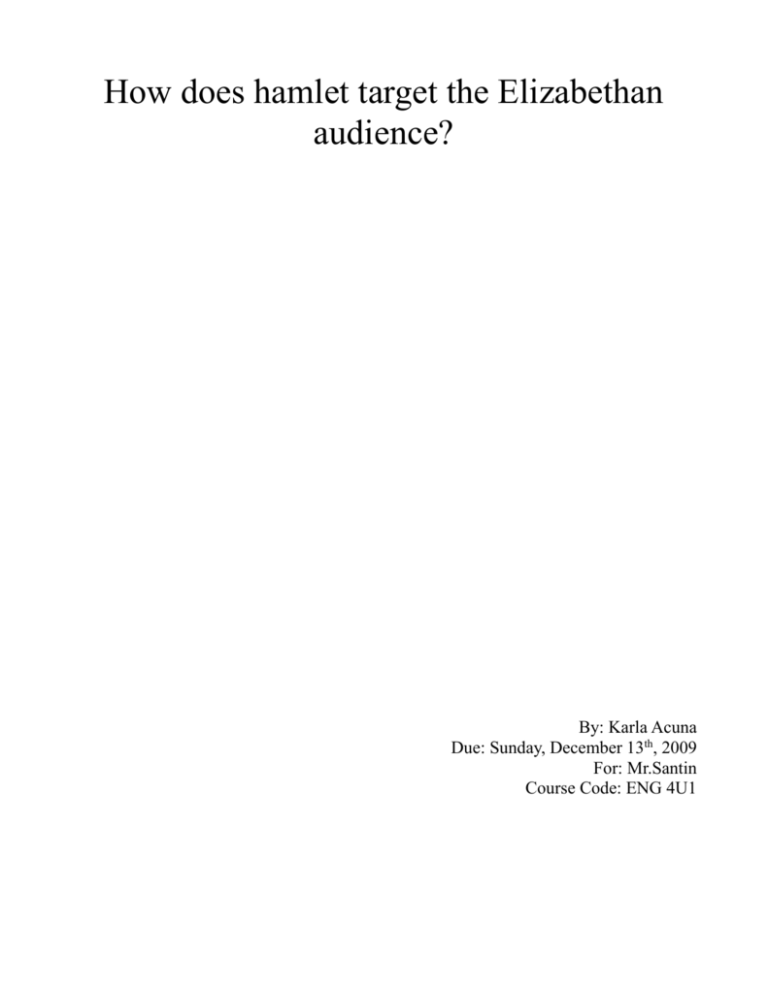
How does hamlet target the Elizabethan audience? By: Karla Acuna Due: Sunday, December 13th, 2009 For: Mr.Santin Course Code: ENG 4U1 There are many hardships that are dealt with in life; hardships such as losing loved ones may cloud ones judgment, sanity, or thoughts. These hardships are something that the characters in Hamlet have to deal with, and it is also something the audience can relate to. In William Shakespeare's Hamlet, there are many components in the play that targeted the Elizabethan audience. The struggles, pain and conflicts that happen in the Hamlet, are something that the audience can relate to. The audience cannot help but to show some feeling towards the characters such as Hamlet and Ophelia. Throughout the play, Hamlet pretended to be insane to hide his true feelings and carry out his revenge. He portrayed this type of character because he found out that his uncle, Claudius, was the man who murdered his father, King Hamlet. Claudius did this to get the throne and take everything King Hamlet had. After committing this act, he was made king of Denmark and managed to make Hamlet's mother Gertrude fall in love with him. Hamlet could not accept what had happened, so he made a promise to avenge his father's death by murdering Claudius. The soliloquy presented by Hamlet, asking whether to be or not to be, is one of the speeches in the play that captivates the audience. This is because the audience can relate to it, and they can anticipate what's to come and see the development of the characters. There is also the example of Ophelia, who becomes insane because of the death of her father Polonius. Ophelia becomes distraught, insane, and misguided while other characters begin to notice her insanity when her father is murdered. She is one of the characters that become seen as a babbling fool throughout the play because of the insane outbursts she has. It will be shown in this essay that the Elizabethan audience is targeted by Hamlet through the analysis of the characters Ophelia and Hamlet. Specifically, it will be examined; Ophelia and Hamlet’s insanity, and the play’s relation to everyday life. In Hamlet, Hamlet realizes how human beings can act violently with full intent over something so small. Hamlet becomes more distraught and revengeful. He also compares humans to the image that God intended. He believes that these people are not using their full potential, and instead acting like mere animals. 2 “Hamlet .....................................What is a man, If his chief good and market of his time Be but to sleep and feed? A beast no more. Sure he that made us with such large discousure, Looking before and after gave us not That capability and god like reasons to fust in us unus'd?” (4.4, pg.169 32-38). Hamlet felt that a person should not just be eating and sleeping. If this is a person, than he is nothing more than a beast, so he explains that this was not the vision of God. God did not create people with freewill and divinity for people not to use it. The effect of this soliloquy on the Elizabethan audience is that the people will look at themselves and how they live their daily lives. It allows the audience to connect to what Hamlet is feeling and connect with his beliefs. This is important because back in the Elizabethan years everything revolved around religion. By Hamlet mentioning what God has intended the people to do will make the people in the audience change their views of their everyday lives. The audience must have thought that Hamlet was right and that there is more purpose to their lives that God intended. This speech made the audience think of ways to change their lives to fulfill what God has intended for them to do. In the play, Hamlet played a person who was insane and depressed. He is seen as delusional, someone who has no care for his words or actions and talks to himself. The audience knows that he was only pretending to be insane to hide his true feelings and to carry out his revenge against his uncle Claudius. For most of the play, he portrayed his character as someone who has lost their sanity and good intent. In his soliloquy, it is seen how Hamlet developed a deeper understanding of how to carry out his plan for revenge. Hamlet also shows a strong anger towards everyone, such as his mother Gertrude and his uncle Claudius. “Hamlet .................Rightly to be great not to sir without great argument But greatly to find quarrel in a straw When honor’s at stake. How stand I then, 3 That have a father killed, a mother stained, Excitements of my reason and my blood, And let all sleep” (4.4, pg.169, 54-59). Hamlet realized what he was left with, if his honor was taken away. He would be left with a father dead and a mother who is defiled. He realized that his honor was at stake and he needed to get his revenge fast before the opportunity was gone. He’s a leader, whom people look up to and admire. If he does not do the right thing no one else will. He is the future king of his country and he needs to lead by example. Hamlet felt shame and determination in the above passage. This soliloquy showed these feeling more than any part of the play before that. It has taken an effect on the audience, for this is the first time Hamlet truly showed his emotions even though he is insane. He developed as a character and this has taken a great effect on the audience. This is because his development showed the audience that if the right thing to do is known, it should be done. If the person does not do it, no one else will and this might end up in a form of suffering and pain. Hamlet begins to show more signs of insanity as the play unfolds. He acts out and does things that he wouldn’t do before, such as killing Polonius. After he murders Polonius, he has no remorse, he simply taunts Claudius. Through his insanity, he takes his anger out towards the people he once loved, such as his mother Gertrude. Hamlet’s mother sees the changes in her son and begins to become worried with his troubling ways. This is why Hamlet gets sent away, because of his insane actions. “Gertrude Mad as the sea and wind when both contend Which is the mightier. In his lawless fit, Behind the arras hearing something stir, Whips out his rapier, cries, ‘A rat, a rat!’ And in this brainish apprehension kills The unseen good old man.” (4.1, pg.157, 7-12) Here Hamlet is portrayed as someone who has completely gone insane. He is doing things that he wouldn’t have done before when he was “sane”. He goes around screaming “a rat a rat” and pulls out his sword and kills whoever is behind the curtain. He wouldn’t have done this before, instead he would have looked to see who it was instead of killing them right away. However the audience knows that 4 Hamlet is just acting insane so that no one will know his plan to avenge his father. The audience can also relate to this because when people do something out of the ordinary and do not act like themselves, others assume that there is something extremely wrong. Sometimes people may even be called insane for simply doing things differently. Losing a loved one is never easy, and it can have numerous effects on people. Sometimes these mishaps can even lead to the person’s death. In the play Hamlet, Ophelia is one of the many characters that become insane through the loss of her father Polonius. She becomes distraught, confused, and crazy after her father is murdered by Hamlet. As other characters begin to realize that Ophelia has become insane, they begin to become worried and troubled by what she is doing. “Gentleman She speaks much of her father, says she hears There’s tricks i’ th’ world, and hems, and beats her heart, Spurns enviously at straws, speaks things in doubt That carry but half sense. Her speech is nothing, Yet the unshaped use of it doth move The hearers to collection. They aim at it, And botch the words up fit to their own thoughts, Which, as her winks and nods and gestures yield them, Indeed would make one think there might be thought, Though nothing sure, yet much unhappily.” (4.5, pg.171, 4-13) Here the Gentlemen speaks about Ophelia’s insanity. He also addresses how she has been speaking very crazily. Everyone who listens to Ophelia is beginning to draw conclusions that she is insane and they believe that it has a lot to do with her father’s death. As other characters become very worried about Ophelia’s insanity, they begin to question what Ophelia could possibly do to herself or others. This relates to the audience because many people become depressed when they lose a loved one. Some people even become insane. This is why the audience can relate to Ophelia because losing a loved one is never easy. Ophelia tries to also deal with the death in her own way by going out and talking to other characters even though she is seen as insane. That is another reason the audience can relate to Ophelia, because many people try to deal with death in their own way. Many of the characters now believe that 5 Ophelia’s mind was poisoned because of her father’s death. They feel that Ophelia should be watched closely because they do not know what she could do to herself or others. They feel that her judgment has been clouded by her insanity, and that she has now completely lost herself. “Claudius Follow her close. Give her good watch, I pray you. Oh, this is the poison of deep grief. It springs All from her Father’s death, and now behold! O Gertrude, Gertrude, When sorrows come, they come not single spies But in battalions. First, her father slain. Next, your son gone, and he most violent author Of his own just remove. The people muddied, Thick, and unwholesome in their thoughts and whispers For good Polonius’ death, and we have done but greenly In hugger-mugger to inter him. Poor Ophelia Divided from herself and her fair judgement, Without the which we are pictures, or mere beasts. (4.5, pg.175, 73-85) The other characters begin to think that Ophelia was robbed of her sanity and that without her sanity, she’s lost and misguided. They believe that because of her father’s death, her grief has taken over her mind and made her become insane. She walks the streets babbling and speaking nonsense. Everyone begins to feel sorry for her because of the grave loss she has suffered and what it has done to her. The audience can relate to this because when people loss someone so close to them, others around them pity them and feel sorry for them. People begin to draw their own conclusions as to what could be wrong with the person, and many of the times they believe they have gone insane. They feel that the person has gone insane because they may just want to stay home, or they may want to keep to themselves. The play Hamlet has targeted the Elizabethan audience in different ways. The play shows the audience the different ways their lives can change and how a chain of events can affect many people. The play shows the people in the audience how to overcome the conflicts and sufferings dealt with in their everyday lives, and not solely seek revenge just like Hamlet. This play also shows the people in the audience that you can deal with death in your own way, just like how Ophelia does by singing and 6 mourning in her own way. Many of the characters, such as Ophelia and Hamlet, become insane through the loss of loved ones. This is why people in the audience can relate to Hamlet, because many people become depressed after losing someone so close to them. This play shows the audience what not to do in life, and what is wrong. Hamlet has shown many aspects of life that people can relate to and that is why the play has targeted the Elizabethan audience in different ways. 7




